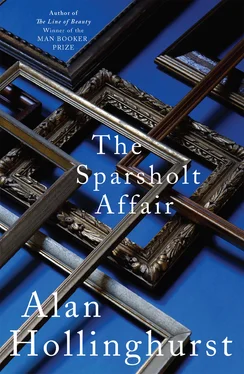Alan Hollinghurst - The Sparsholt Affair
Здесь есть возможность читать онлайн «Alan Hollinghurst - The Sparsholt Affair» весь текст электронной книги совершенно бесплатно (целиком полную версию без сокращений). В некоторых случаях можно слушать аудио, скачать через торрент в формате fb2 и присутствует краткое содержание. Год выпуска: 0101, Издательство: Pan Macmillan, Жанр: Старинная литература, на английском языке. Описание произведения, (предисловие) а так же отзывы посетителей доступны на портале библиотеки ЛибКат.
- Название:The Sparsholt Affair
- Автор:
- Издательство:Pan Macmillan
- Жанр:
- Год:0101
- ISBN:нет данных
- Рейтинг книги:5 / 5. Голосов: 1
-
Избранное:Добавить в избранное
- Отзывы:
-
Ваша оценка:
- 100
- 1
- 2
- 3
- 4
- 5
The Sparsholt Affair: краткое содержание, описание и аннотация
Предлагаем к чтению аннотацию, описание, краткое содержание или предисловие (зависит от того, что написал сам автор книги «The Sparsholt Affair»). Если вы не нашли необходимую информацию о книге — напишите в комментариях, мы постараемся отыскать её.
The Sparsholt Affair — читать онлайн бесплатно полную книгу (весь текст) целиком
Ниже представлен текст книги, разбитый по страницам. Система сохранения места последней прочитанной страницы, позволяет с удобством читать онлайн бесплатно книгу «The Sparsholt Affair», без необходимости каждый раз заново искать на чём Вы остановились. Поставьте закладку, и сможете в любой момент перейти на страницу, на которой закончили чтение.
Интервал:
Закладка:
I went on, ‘What on earth did you find to talk about?’
Peter looked at me rather oddly. ‘If you must know, we talked about you. He doesn’t know what to make of you.’
‘Oh,’ I said, both amused and very slightly wounded, ‘I thought I was nice to him.’
‘No, no, he said you were. He’s probably just not used to your style. He’s from Nuneaton.’
‘Oh . . . yes.’ There was something null about it, as a fact, though the only fact I knew about Nuneaton was that George Eliot also came from there.
‘Well, we must press on,’ said Peter, and led his silent model, if that’s what he was, out of the shop. In fact George Chalmers must have spoken, because I heard Peter saying quite sharply, ‘No, he’s not,’ as they stepped into the street.
5
There were now enough of us going out from Oxford to Woodstock for a special bus to be laid on – it picked us up in St Giles’: filers and typists, who’d been billeted in Keble College, a small body of students which expanded in intriguing ways, and half a dozen dons, linguists mainly, who had not already joined up. We trundled out the five or six miles through the autumn countryside, as if on an excursion away from the War; though once we turned in through the gates of the Palace we found a scene disfigured with the guard huts, Nissen huts and paraphernalia of a wartime base. I was there for two or three days a week, and was often back in College quite late. As a result I saw Evert less, and was so busy with other and, on the whole, graver secrets that I rather forgot about the Sparsholt thing.
I came up the stairs one evening about nine o’clock, and bumped into Evert coming down. ‘Oh, thank God,’ he said.
‘Come and have a drink.’ He followed me back into the room. ‘How are you?’
He stood and gazed at me with a remote smile, as if it should have been obvious. He was wearing a finely cut suit, as usual, with a soft blue cravat at the throat; he seemed to have put on quite a lot of some rather florid scent. He also looked as if he hadn’t slept for days. ‘Oh, Fred,’ he said, ‘you’re the only person I can really talk to. Most people would be horrified, or disgusted, but you understand.’
‘Well,’ I said, cautiously, ‘I don’t know.’ I made him sit down, and poured him a glass of port. ‘So much of that sort of thing went on at school it would seem very odd to me if it suddenly stopped at Oxford – especially now, you know, with things in such a muddle and no one knowing what’s round the corner.’
‘I couldn’t bear it any longer,’ he said, ‘I can’t think, I can’t do any work. Garvey gave me hell over my Dryden essay.’
‘All because of Sparsholt,’ I said.
‘I even wrote him a poem, and left it in his pigeonhole.’
‘Garvey’s . . . ?’
‘David’s, of course.’
‘And what did he say about that?’
‘I went back a few minutes later and took it out again.’
‘Not good enough,’ I said sternly.
‘It was a beautiful poem.’
‘I mean, you’ve got to do something, Evert – at least get to know him a bit.’ And when you do, I thought, you’ll see he’s not worth all this trouble.
Evert sipped his port and stared at the carpet. ‘I just have done something – I’ve just been to his rooms.’
I sat down too, and Evert stretched out on my little sofa, looking away from me, like an analyst’s patient. The narration that followed was pained and hesitant, and he seemed to run away several times from his own decision to tell the story. But I give it here as I summarized it later that night in my diary, which even now makes me hear particular phrases in his soft deep voice. With the blackout he had been unable to tell from the quad if Sparsholt was in. He had gone upstairs very quietly, two at a time, and found that his oak was open, and stood there for some minutes listening and hardly daring to breathe. He believed he could hear an occasional sound. I said had it been rhythmical creaking? Evert said no, and I couldn’t tell if he smiled. It was perhaps ‘like someone turning the pages of a book’. He remained there in the dark for five minutes or more, but simply couldn’t bring himself to knock. There was only a little light leaking out under the door. ‘It was quite an eerie feeling to be so close to him, without him knowing.’
I couldn’t help feeling it would have been more eerie for Sparsholt, had he found out. I said, ‘You didn’t stoop to peering through the keyhole.’
‘Of course I stooped, but the thing was down on the other side.’
‘Do tell me you knocked in the end.’
‘I did,’ said Evert, pausing to drink and nod ruefully at the recollection. But there had been no reply. He waited for a while, then knocked again. Whatever the noise was that he thought he could hear had stopped, but he didn’t know if he had been imagining it, or if Sparsholt was sitting just feet away pretending not to be there. So with sudden decisiveness Evert turned the handle and went in. There he was at last in the room of the loved one in all its unguarded ordinariness. No one was there but he had the strange sensation that the room itself was staring at him, as at a man who was taking advantage of another’s innocence. At the same time he was giving the disappointing contents of the room – the few books, the Ladbroke’s calendar, the commoner’s gown that hung beneath a Boat Club cap on a hook – the most tender and generous appraisal they can ever have received. Next to the desk some barbells and Swedish clubs were placed against the wall. There was a fire in, and Sparsholt had got in some logs, which Evert saw must have been the noise he’d heard. They were crackling behind the old wire fireguard. It was warm in there, and of course with the shutters closed and the curtains pulled across it was quite snug; it had the emptiness of a room which seems to expect any moment the footsteps of its owner on the stairs below. The door was open into the unlit bedroom, and Evert drifted towards it and looked in, and had hardly taken a step inside when there was a sudden rustling noise in the shadows and a voice said, ‘Oh, hello!’
The feeling of being caught was disastrous, it meant the scandalous exposure of his desires. He hardly knew what he said, as he backed away into the sitting room, apologizing for waking him, and watching fearfully as Sparsholt got off the bed and came towards him into the light – and it wasn’t him. Evert stared and laughed. He thought for a second he must have gone into the wrong room, that all the drama of waiting had been an absurd waste of time and anxious emotion, and that the barbells and the cap and the books on dynamics were mere effects in some bewildering coincidence. But no, he was sure, it was Sparsholt’s room, his bedroom, but with another man in it.
‘So what did you say?’ I asked.
‘I said I was looking for David, which was perfectly true, of course. And he said, so was he, but he’d just had a little lie down while he was waiting.’ Evert sat forward slightly to take another sip of port – I saw the moment’s calculation as he left a quarter-inch in the glass.
A strange conversation had ensued between the two intruders, though Evert was so thrown that it didn’t strike him at first that the other man’s story was a very odd one. Both of them were confused, which saved the situation up to a point. They introduced themselves; the stranger was called Gordon Pinnock, he was at St Peter’s College, and he came from Nuneaton – he had been at school with Sparsholt, and claimed outright to be his best friend.
Over the next few minutes Evert seems to have found out a good deal about him, though whether he revealed as much of himself I doubt. They had quite a chat; and Evert found him attractive, in a peculiar way, with a smile he couldn’t help thinking somehow suspicious. If Pinnock and Sparsholt were such close friends it seemed horribly likely to Evert that Sparsholt must have mentioned him, the strange second-year man who was always staring and hanging about in odd places. And it was certain that after this present encounter Pinnock would tell Sparsholt just what had happened – Evert himself was now listening for footsteps outside, while conscious of the need to use the small time available to make his case. I didn’t like to say I thought it quite likely that Sparsholt had hardly taken Evert in at all.
Читать дальшеИнтервал:
Закладка:
Похожие книги на «The Sparsholt Affair»
Представляем Вашему вниманию похожие книги на «The Sparsholt Affair» списком для выбора. Мы отобрали схожую по названию и смыслу литературу в надежде предоставить читателям больше вариантов отыскать новые, интересные, ещё непрочитанные произведения.
Обсуждение, отзывы о книге «The Sparsholt Affair» и просто собственные мнения читателей. Оставьте ваши комментарии, напишите, что Вы думаете о произведении, его смысле или главных героях. Укажите что конкретно понравилось, а что нет, и почему Вы так считаете.












